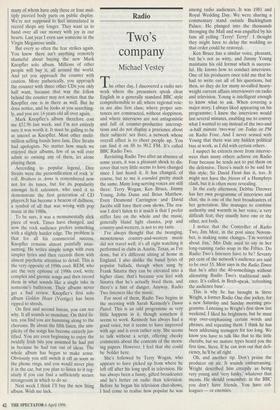Radio
Two's company
Michael Vestey
The other day, I discovered a radio net- work where the presenters speak clear English in a generally standard BBC style comprehensible to all; where regional voic- es are also first class; where proper sen- tences are constructed, without sloppiness, and where interviews are not antagonistic and full of counter-productive interrup- tions and do not display a prurience about their subjects' sex lives; a network whose overall effect is to cheer people up. You can find it on 88 to 90.2 FM. It's called BBC Radio Two.
Revisiting Radio Two after an absence of some years, it was a pleasant shock to dis- cover that very little seems to have changed since I last heard it. It has changed, of course, but to me it sounded pretty much the same. Many long-serving voices are still there: Terry Wogan, Ken Bruce, Jimmy Young, John Dunn and Brian Matthew. Even Desmond Carrington and David Jacobs still have their own shows. The rea- son I don't listen to it much is that I prefer stiffer fare on the whole and the music, generally bland light classics, pop and country-and-western, is not to my taste. I've always thought that the twanging, monotonous country-and-western music did not travel well; it's all right watching it performed in clubs in Austin, Texas, as I've done, but it's different sitting at home in England. I also dislike the banal lyrics of popular ballads, though when sung by Frank Sinatra they can be elevated into a higher class; that's because you feel with Sinatra that he's actually lived them, and there's a hint of danger. Anyway, Radio Two listeners like the music.
For most of them, Radio Two begins in the morning with Sarah Kennedy's Dawn Patrol. This is an odd programme as very little happens in it, though somehow it seems to work. Kennedy has always had a good voice, but it seems to have improved with age and is even rather sexy. She seems to talk without a script, offering cheeky comments about the contents of the morn- ing papers. However, I feel that she could be bolder here.
She's followed by Terry Wogan, who appears to have picked up from where he left off after his long spell in television. He has always been a funny, gifted broadcaster and he's better on radio than television. Before he began his television chat-shows, I had come to realise how popular he was among radio audiences. It was 1981 and Royal Wedding Day. We were sharing a commentary stand outside Buckingham Palace. He plunged into the thousands thronging the Mall and was engulfed by his fans all yelling 'Terry! Terry!'. I thought they might have to delay the wedding so that order could be restored.
Ken Bruce has a similar voice, pleasant, but he's not as witty, and Jimmy Young maintains his old format which is success- ful. He knows how to conduct interviews. One of his producers once told me that he had to write out all of his questions, but then, so they do for many so-called heavy- weight current affairs interviewers on radio and television. Young is intelligent enough to know what to ask. When covering a major story, I always liked appearing on his programme; I knew the interviews would last several minutes, enabling me to convey what I wanted to say instead of the two-and -a-half minute `two-way' on Today or PM on Radio Four. And I never sensed with Young that there was any hidden political bias at work, as I did with certain others.
I suspect he extracts more from intervie- wees than many others achieve on Radio Four because he tends not to put them on the defensive. There's much to be said for this style; Sir David Frost has it, too. It might not have the frisson of a Humphrys clash, but it is often more revealing.
In the early afternoon, Debbie Thrower has her own programme of interviews and chat; she is one of the best broadcasters of her generation. She manages to combine authority and warmth in her voice, a very difficult feat; they usually have one or the other, not both.
I notice that the Controller of Radio Two, Jim Moir, in the post since Novem- ber, is making some changes. 'I'm worried about Jim,' Mrs Dale used to say in her long-running radio soap in the Fifties. Do Radio Two's listeners have to be? Seventy per cent of the network's audience are said to be over 55. Moir says in the Radio Times that he's after the 40-somethings without alienating Radio Two's traditional audi- ence. It's called, in Beeb-speak, 'refreshing the audience base'.
This is why he has brought in Steve Wright, a former Radio One disc jockey, for a new Saturday and Sunday morning pro- gramme. Listening to Wright's first show last weekend, I liked his brightness, but he must stop over-emphasising certain words and phrases, and repeating them. I think he has been addressing teenagers for too long. We know you have to talk like that to the little cherubs, but we mature types heard you the first time, Steve. If he can iron out that defi- ciency, he'll be all right.
Oh, and another tip. Don't praise the producer on air. It sounds embarrassing. Wright described him creepily as being very young and 'very funky,' whatever that means. He should remember: in the BBC you don't have friends. You have col- leagues — or enemies.


























































 Previous page
Previous page